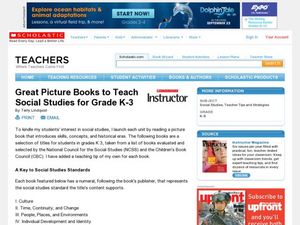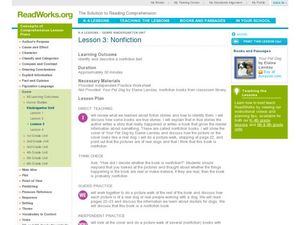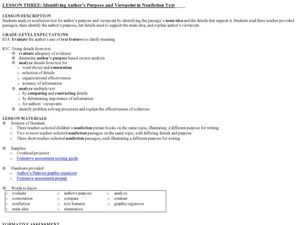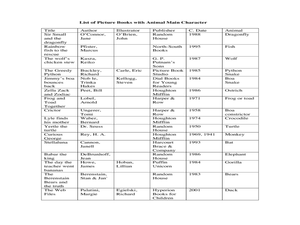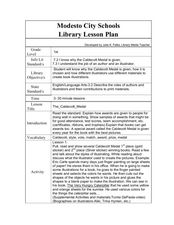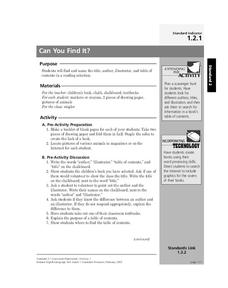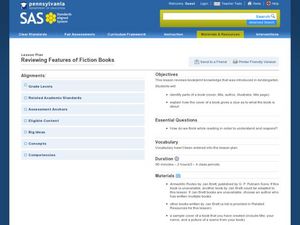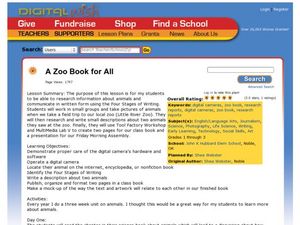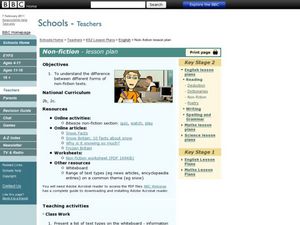Curated OER
Introduce Vocabulary: A Picture Book of Abe Lincoln (Adler)
The story of Abe Lincoln serves as the backdrop to this vocabulary-in-context activity as you read David Adler's A Picture Book of Abraham Lincoln. Scholars learn these politically themed words before listening to you read the story...
Curated OER
Great Picture Books to Teach Social Studies for Grade K-3
Every class enjoys reading new books at the beginning of a unit. Use this resource to identify a variety of books for kindergarten to third grade that can be used to complement social studies standards. The books can kindle learners'...
Curated OER
Introduce Vocabulary: Firefighters (Mitten)
Your budding readers know what it's like to get to a word and think, "What does that mean?" Expand their vocabulary in context using Christopher Mitten's nonfiction picture book Firefighters. Get them ready by pre-teaching the new words...
Curated OER
My Community Book
Young learners examine different places in their neighborhood using informational texts. First they identify a place that they like to play and predict if it will be in the nonfiction book Community at Play.They will share their favorite...
Curated OER
Lesson 3: Nonfiction
Introduce young readers to the word of non-fiction. They examine the features found in non-fiction books such as, facts, dates, and realistic pictures. They discuss how the images in the book Your Pet Dog depict real dogs doing real...
Curated OER
Compare and Contrast Nonfiction Texts
Explore nonfiction writing by comparing and contrasting two different texts. After reading two nonfiction books, articles, or magazines, students utilize a graphic organizer to record their similarities and differences. They answer study...
Curated OER
Identifying Author’s Purpose and Viewpoint in Nonfiction Text
Why do people write books? Pupils discover how to identify the author's viewpoint. They read non-fiction passages their instructor selects (the plan has the class look at nonfiction children's picture books), and then identify the...
Curated OER
Lesson Plan 3: Great Book, Gross Book
It's time for your scholars to become book reviewers! Start with a fun review of foods: are they good or gross? Learners apply these evaluation techniques to books, recording their thoughts on large pieces of butcher paper. Simply have...
Curated OER
Introducing Vocabulary: Christopher Columbus (Weinberger)
The story of Christopher Columbus has fascinated young historians for centuries; use this vocabulary-in-context strategy to dive into Kimberly Weinberger's picture book about this classic explorer. Begin by introducing the new words:...
Curated OER
A House is a House for Me: Library Skills for Young Readers
Read Mary Ann Hoberman's book A House is a House for Me to introduce the idea that a library is a house for shelves of books. Young readers practice alphabetizing in the picture book (easy fiction) section of the library. They learn how...
Read Works
Biography
Familiarize your class with the genre of biography. After some direct instruction about biography, work together to discuss historical facts and significant events from A Picture Book of Anne Frank by David A. Adler. In order to assess...
Curated OER
Find an Animal! Find a Book!
Learners identify the themes of different books by classifying their genre. In this genre lesson, students examine a specific animal by reading both a nonfiction and fiction book about the species. Learners compare the different books...
Curated OER
Creating a Newspaper
Get the scoop with a fun, engaging newspaper project. After analyzing the parts of a newspaper, including the headline, subtitles, and pictures or images, young journalists get to work by writing their own stories in a newspaper article...
Curated OER
Authors and Illustrators: What do they do?
Help readers understand the roles of authors and illustrators and why they have been recognized by medals of excellence. Your class will discuss and then create illustrations for a book. When they have finished, you can hold your own...
Curated OER
Butterfly, Butterfly: Teaching Vocabulary
Kindergarteners practice new words through listening to and reading the science book Butterfly by Jenny Feely. The teacher will first choose words that are essential for understanding the text. Then, using pictures in the text, pupils...
Curated OER
Can You Find It?
Plan a Parts of a Book scavenger hunt. Begin by giving your young adventurers a book, and asking them to find the title, author, illustrator, and table of contents. After a discussion of the purpose of each of these items, class members...
Curated OER
Reading Strategies for Decoding Tricky Words
Help primary school pupils learn valuable reading strategies. As they choral read a poster or big book, they predict covered words and learn various reading strategies for figuring out an unknown word. This will help them gain an...
Curated OER
Lesson 2: Fiction
What makes a book fiction or nonfiction? Kindergartners discover ways to find out if a book is real or made up. They examine a fictional picture book as a group and decide what clues help them decide. There is an independent worksheet...
Curated OER
Poke and Look Learning Books
Students read Poke and Look Learning Books and complete predicting activities, reading, questioning, and more. In this Poke and Look Learning Books, students do this for 13 different books.
Curated OER
Reviewing Features of Fiction Books
Students identify the features of fiction books. In this genre study lesson, students are introduced to the book Armadillo Rodeo and identify the cover, title, author, illustrator and title page. Students discuss how the book cover gives...
Curated OER
A Zoo Book for All
A visit to the local zoo launches an integrated life science/ language arts research project into the habitat, feeding habits, offspring, lifespan, and other interesting facts about animals. Each group selects two animals to photograph...
Curated OER
Fiction vs. Nonfiction
Students find the difference between fiction and nonfiction. In this fiction/nonfiction lesson, 1st graders read the story Johnny Appleseed and discuss what makes this a nonfiction story. They listen to a fiction story and see what...
Curated OER
Non-Fiction Animal Picture Books
Students complete a multi-lesson plan unit using research to create their own book about an animal of their choice. After discussing the elements of non-fiction texts, they use internet research to explore an animal of interest to them....
Curated OER
Non-Fiction Texts
Third graders examine different types of non-fiction texts. In this non fiction lesson, 3rd graders use different types of texts to gather information. Students work in groups to analyze the texts for author's purpose, common themes, and...



